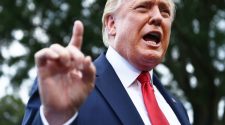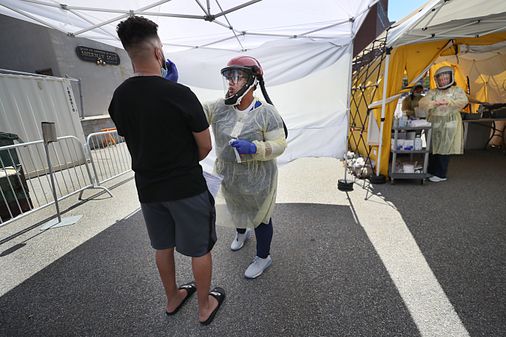“You do not necessarily need a test unless you are a vulnerable individual or your health care provider or State or local public health officials recommend you take one.”
Dr. Ashish K. Jha, director of the Harvard Global Health Institute, said Thursday that the change is inexplicable.
“Basically, there is no good reason to have made this change,” Jha said. “It’s clearly going to be harmful. … I know the scientists at the CDC, and there is no new science that they are responding to.”
If the science has changed, Jha said, the government should say so and explain how. But the fact that there’s no indication anything has changed makes the about-face “disturbing, upsetting and harmful,” Jha said.
He said “one can only speculate” on the reason for the change, and that it seems as if the Trump administration is responding to the strain on the nation’s testing capacity by “arguing that people who clearly need to be tested shouldn’t be tested.”
If government officials believe they need to ration limited testing supplies, they should just “level with the American people” and say that, rather than misrepresent the science, Jha said. The new guidelines, he said, will likely “accelerate the number of new infections.”
He added that the CDC has long been regarded as the gold standard for public health guidelines, but the current politicization of the agency has tarnished its image.
Many CDC guidelines on COVID-19, he said, are sound, but “it takes a lot of expertise to figure out which ones are based on science and which ones are based on politics. And the whole point of having a CDC is that you didn’t have to figure that out.”
The CDC didn’t immediately respond to a request for comment Thursday.
“I didn’t find just sort of clear misrepresentation of the science under the Bush administration or an Obama administration,” Jha said. “It’s a whole new world, and I don’t think the American people are being served well.”
On Wednesday, Dr. Anthony Fauci, the country’s top infectious disease expert and perhaps the best known task force member, said he wasn’t part of the discussion that green-lighted the change.
Fauci told CNN he was undergoing surgery when the new guidance was discussed last week, adding he was “worried it will give people the incorrect assumption that asymptomatic spread is not of great concern. In fact it is.”
Eleanor J. Murray, an assistant professor of epidemiology at Boston University, strongly criticized the new guidelines Wednesday via Twitter.
“This is 100% completely absolutely awful. If the CDC’s recommendations can be changed for political reasons, then we cannot rely on them to keep us safe,” Murray tweeted. “And if we cant rely on the CDC, then who do we have left???”
Dr. Michael Mina, an assistant professor of epidemiology at Harvard’s T.H. Chan School of Public Health, also took to social media to voice opposition to the changes.
“At what point does society rise up?” Mina tweeted in response to a CNN story about the new guidelines. “We have a Trump administration apparently placing politics and image over American lives. At every turn, the administration has afforded #COVID19 every opportunity to spread further. This is a national travesty and should be called out as such.”
He wrote that he doesn’t know “what society can do though, at this point, except vote in November and screen loudly via the media. The latter I think will do little. The former will affect change.”
Material from the Associated Press was used in this report.
Travis Andersen can be reached at [email protected]. Follow him on Twitter @TAGlobe.
















